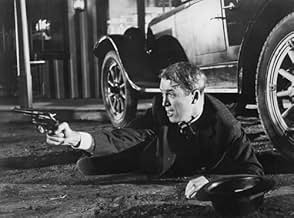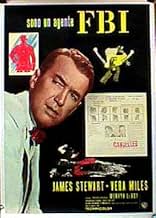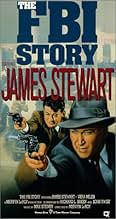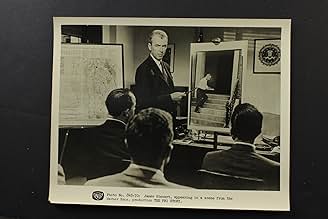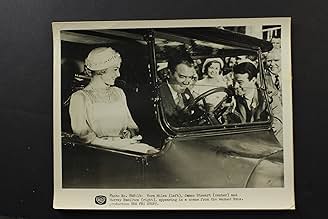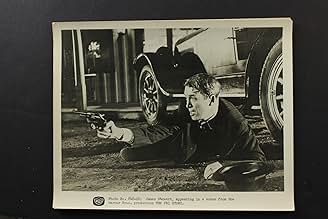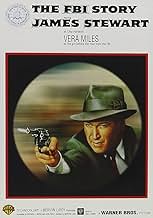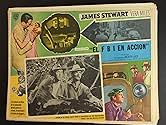IMDb-BEWERTUNG
6,5/10
4082
IHRE BEWERTUNG
Ein engagierter FBI-Agent erinnert sich an die Kämpfe der Behörde gegen den Ku-Klux-Klan, das organisierte Verbrechen und kommunistische Spione.Ein engagierter FBI-Agent erinnert sich an die Kämpfe der Behörde gegen den Ku-Klux-Klan, das organisierte Verbrechen und kommunistische Spione.Ein engagierter FBI-Agent erinnert sich an die Kämpfe der Behörde gegen den Ku-Klux-Klan, das organisierte Verbrechen und kommunistische Spione.
- Regie
- Drehbuch
- Hauptbesetzung
- Auszeichnungen
- 1 Nominierung insgesamt
Ken Mayer
- Casket Salesman
- (as Kenneth Mayer)
Victor Adamson
- Train Passenger
- (Nicht genannt)
Luana Anders
- Mrs. Graham
- (Nicht genannt)
Empfohlene Bewertungen
This is an entertaining "history" of the FBI, but it should be viewed as fiction, because that's exactly what it is. What else could it be when J. Edgar Hoover personally approved and had a cameo role in the production. James Stewart is excellent, as usual, and the supporting cast, except for the talentless Vera Miles, is good. Murray Hamilton is especially good in a supporting role as Stewart's partner and best friend. The FBI accomplishments that the film highlights are undoubtedly all true. What is significant is what it leaves out.
One of the most shameful parts of the film is the depiction of the killing of John Dillinger. It is portrayed pretty much as it happened, but no mention at all is made of Melvin Purvis, the Chicago Bureau Chief who headed the operation. Instead, the operation is depicted as if the fictional Chip Hardesty were running it. It has been said that Hoover was jealous of the publicity that Purvis received after Dillinger was killed; Purvis was subsequently transferred to a remote outpost, and shortly afterward left the FBI. This is no doubt why Purvis was never mentioned in the film. But this viewer, at least, paused to think that if Purvis was treated this way, what about all the agents who conducted all the other operations depicted in the film. Were they also completely ignored and replaced by the fictional Hardesty.
The film is probably accurate in its portrayal of FBI activity up through the end of WWII. However, after that point, the film would have us believe that the only threat facing the US came from international communism, which is no doubt what Hoover believed. Never mind the Mafia. Never mind the lynchings that were still going on in the South. Never mind that blacks were being intimidated to keep them from voting in much of the South. I don't know if the FBI had started wiretapping Martin Luther King by the time this film was made, but if not, it wasn't very long afterward that it started.
As I said at the outset, this is pretty good entertainment, but it should be viewed as the sanitized fictionalization that it is.
One of the most shameful parts of the film is the depiction of the killing of John Dillinger. It is portrayed pretty much as it happened, but no mention at all is made of Melvin Purvis, the Chicago Bureau Chief who headed the operation. Instead, the operation is depicted as if the fictional Chip Hardesty were running it. It has been said that Hoover was jealous of the publicity that Purvis received after Dillinger was killed; Purvis was subsequently transferred to a remote outpost, and shortly afterward left the FBI. This is no doubt why Purvis was never mentioned in the film. But this viewer, at least, paused to think that if Purvis was treated this way, what about all the agents who conducted all the other operations depicted in the film. Were they also completely ignored and replaced by the fictional Hardesty.
The film is probably accurate in its portrayal of FBI activity up through the end of WWII. However, after that point, the film would have us believe that the only threat facing the US came from international communism, which is no doubt what Hoover believed. Never mind the Mafia. Never mind the lynchings that were still going on in the South. Never mind that blacks were being intimidated to keep them from voting in much of the South. I don't know if the FBI had started wiretapping Martin Luther King by the time this film was made, but if not, it wasn't very long afterward that it started.
As I said at the outset, this is pretty good entertainment, but it should be viewed as the sanitized fictionalization that it is.
When I was a very young teen, I saw this in the theater and was just awed. The different segments were very dramatic and stayed with me for decades.
So after a long, long absence, seeing this again in the late '90s turned out to be a major disappointment. As a kid, this movie was exciting, but it sure isn't now. It's two-and-a-half hours long and moves pretty well but too much time is spent on the marriage of Jimmy Stewart-Vera Miles ("Chip and Lucy Ann Hardesty").
As one who watches a lot of modern- day crime movies, it was odd to see one with absolutely no profanity in it and very little blood, but that's because it's a 1959 film. We see the FBI cracking down on the KKK, anti- Native Americans, the Communists, spies, etc. Some of those parts are exciting, but nothing like when it came out almost 50 years ago. Now, it's almost ho-hum stuff.
For me now, this movie is more of a nostalgia piece than anything else. Frankly, I doubt if I would watch it again.
So after a long, long absence, seeing this again in the late '90s turned out to be a major disappointment. As a kid, this movie was exciting, but it sure isn't now. It's two-and-a-half hours long and moves pretty well but too much time is spent on the marriage of Jimmy Stewart-Vera Miles ("Chip and Lucy Ann Hardesty").
As one who watches a lot of modern- day crime movies, it was odd to see one with absolutely no profanity in it and very little blood, but that's because it's a 1959 film. We see the FBI cracking down on the KKK, anti- Native Americans, the Communists, spies, etc. Some of those parts are exciting, but nothing like when it came out almost 50 years ago. Now, it's almost ho-hum stuff.
For me now, this movie is more of a nostalgia piece than anything else. Frankly, I doubt if I would watch it again.
... and this little obscure piece of cinema history takes a book written about the FBI and turns it into two well told interwoven stories. One is the story of the life of one of the first FBI agents, the fictional John Hardesty (James Stewart) and his personal life through about 35 years as he marries and raises a family. The other is the story of the FBI from its infancy, told through the eyes and narration of Hardesty himself, covering several cases through the years including the Klan in the 20s, gangsters in the 30s, wartime espionage in the 40s, and then Communist espionage in the 50s. Vera Miles plays Hardesty's wife who does have her limits as the family is moved all over the country as Hardesty's assignments change.
One of the most interesting scenes to me is inside the Washington Bureau where dozens of women are in a big windowless concrete room filing stacks of correspondence by hand. That had to be mind numbing work.
I was surprised when I discovered the director was Mervyn LeRoy, because, although he directed some good ones over the years, he had a couple of bad habits. One was taking every single adapted play he directed and making it look like a play. In 1932 he actually changed scenes in one such film by having a curtain fall and then rise on another scene. The other bad habit was taking adapted books and have them play out like somebody is reading you the book - books on tape on film so to speak. This film, however, was done very well. But then I learned he and J. Edgar Hoover were friends, so maybe he had an extra incentive to have this one turn out well.
Agent Hardesty was certainly at the center of some big operations. The great irony of that being that J. Edgar was such a jealous guy that Hardesty would have spent a large part of his career in exile if he had been a real person with such a record of success. But then we would have no movie. So I found the secret to enjoying this film is to just forget about some of the actual truth that this film whitewashes over and enjoy it as an action/crime film of the time.
It can get a bit heavy handed and corny at times, but it holds up well due to the bigger than life talent of every man James Stewart.
One of the most interesting scenes to me is inside the Washington Bureau where dozens of women are in a big windowless concrete room filing stacks of correspondence by hand. That had to be mind numbing work.
I was surprised when I discovered the director was Mervyn LeRoy, because, although he directed some good ones over the years, he had a couple of bad habits. One was taking every single adapted play he directed and making it look like a play. In 1932 he actually changed scenes in one such film by having a curtain fall and then rise on another scene. The other bad habit was taking adapted books and have them play out like somebody is reading you the book - books on tape on film so to speak. This film, however, was done very well. But then I learned he and J. Edgar Hoover were friends, so maybe he had an extra incentive to have this one turn out well.
Agent Hardesty was certainly at the center of some big operations. The great irony of that being that J. Edgar was such a jealous guy that Hardesty would have spent a large part of his career in exile if he had been a real person with such a record of success. But then we would have no movie. So I found the secret to enjoying this film is to just forget about some of the actual truth that this film whitewashes over and enjoy it as an action/crime film of the time.
It can get a bit heavy handed and corny at times, but it holds up well due to the bigger than life talent of every man James Stewart.
This is a film that on the surface would seem to be all about J.Edgar Hoover giving himself a a big pat on the back for fighting Klansmen,going after Indian killers, hunting the famous gangsters of the 1930's, fighting Nazi's in the US and South America during world war 2 and Commies in New York during the early 1950's. Of course in 1959 we did not know about Mr. Hoover's obsession for keeping secret files on honest Americans, bugging people like the Rev. Martin Luther King, Jr, but worst of all,his secret love affair with his deputy director,Clyde Tolson( If you want to know more about that subject, I suggest seeing the film Citizen Cohn). Hoover aside, This story of a life in the FBI as told by Jimmy Stewart makes for a decent, but dated film. Vera Miles as his devoted wife is also good. But Jimmy is the movie. As much as Hoover controlled production and always made sure the FBI was seen without fault, Jimmy Stewart gave the film a human side,quite an achievement considering Hoover was always looking over his shoulder. The background score is also pleasant. I have read recent online articles suggesting that this is a forgotten film. Jimmy Stewart was one of the greatest film stars of all time and none of his films should be forgotten. TCM was the last network to show it a long time ago and I hope they show it again.
This starts almost like a high school educational film about the FBI. The narration is actually veteran agent Chip Hardesty (James Stewart) doing a lecture. He recounts the story of the FBI starting from its early haphazard days in 1924. He marries pretty librarian Lucy Ann Ballard (Vera Miles). Over the years, he investigates the Ku Klux Klan, the Osage Indian murders, various gangsters, Nazis in Brazil, and communist spies.
This is a sympathetic look at the FBI approved by Hoover. The opening is like a school educational film which is par for the course. It's an old fashion take on the federal police force. It definitely doesn't indulge in any controversies against the FBI. There may violence by the KKK but there is no mentions of lynching. They round up enemy aliens during WWII but they don't talk about the thousands of innocent citizens in internment camps. It's also episodic in nature. The plot doesn't flow as much as it continues on and on. This is definitely a movie where Hollywood submits to authority.
This is a sympathetic look at the FBI approved by Hoover. The opening is like a school educational film which is par for the course. It's an old fashion take on the federal police force. It definitely doesn't indulge in any controversies against the FBI. There may violence by the KKK but there is no mentions of lynching. They round up enemy aliens during WWII but they don't talk about the thousands of innocent citizens in internment camps. It's also episodic in nature. The plot doesn't flow as much as it continues on and on. This is definitely a movie where Hollywood submits to authority.
Wusstest du schon
- WissenswertesTwo FBI agents were on the set at all times.
- PatzerJennie forgets her speech at a mid-term Honor Society event. When her father comforts her in the family car a few moments later, the cherry blossoms are in bloom; this usually occurs in early April in Washington (DC). However, after they leave the car with the radio still on, a news bulletin breaks in, announcing the attack on Pearl Harbor, which took place on December 7, 1941. No cherry blossoms would have been in bloom then, nor would the weather have been mild enough as depicted in the accompanying scenes.
- Zitate
[first lines]
John Michael Hardesty: [narrating] Webster's International Dictionary defines murder as the unlawful taking of human life by another human being. On a November evening in 1955, the definition became obsolete. A mass murder was being planned.
- VerbindungenEdited from Es wird immer wieder Tag (1954)
Top-Auswahl
Melde dich zum Bewerten an und greife auf die Watchlist für personalisierte Empfehlungen zu.
- How long is The FBI Story?Powered by Alexa
Details
- Erscheinungsdatum
- Herkunftsland
- Sprache
- Auch bekannt als
- The FBI Story
- Drehorte
- Produktionsfirmen
- Weitere beteiligte Unternehmen bei IMDbPro anzeigen
- Laufzeit2 Stunden 29 Minuten
- Seitenverhältnis
- 1.66 : 1
Zu dieser Seite beitragen
Bearbeitung vorschlagen oder fehlenden Inhalt hinzufügen



